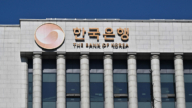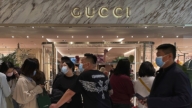【新唐人2011年5月14日讯】大陆的海关总署最新资料显示,4月份出口1556.9亿美元,但进口增长疲软。专家指出,由于补贴政策,中国出口强劲,本质上是中国国家补贴国外消费者,但这种发展孕育巨大危险。
中国海关5月10号公布资料显示,4月份出口1556.9亿美元创下新高,而贸易顺差114.2亿美元,远超一季度的7.1亿美元。不过,海关的资料与商务部长陈铭德的说法却有出入。
就在本周的美中战略与经济对话上,陈德铭声称:“从贸易角度来看,西方对中国人民币的担忧和疑虑毫无根据,因为过去三年,中国贸易顺差一直在减少。”
对于中国强劲的出口,经济学家程晓农认为,中国产品的出口是靠中国(共)政府的退税政策,结果是导致国内的价格反而比国外高。
经济学家程晓农:“中国很多出口商品本身就是压低价格出口的,出口的时候,出口企业没有利润,是赔本做买卖。那么政府怎么维持这些企业的生产呢?政府提供出口退税,大概退税率在平均百分之十左右,这个退税率就是企业的利润。”
程晓农指出:“中国的出口企业产品内销,它就没有出口退税,所以价格要比国外的价格要高的多。也就是说中国(共)政府补贴了外国消费者,但允许国内消费者吃亏。但要是不给出口退税,这些出口企业早就停止出口了。”
显然这种出口并不能真正带来经济增长,人民财富也不会增加。
英国经济预测机构环球透视(IHS Global Insight)首席经济学家阿利斯泰尔•桑顿(Alistair Thornton),针对中国出口强劲、进口疲软现况,推断为“中国经济减速”而不是国际需求强劲造成的,他认为,中国经济再度出现疲弱。
大陆经济学家吴敬琏,也提出了对中国经济内部失衡的担忧。
吴敬琏认为,在现行体制下,资本的所有者主要是国家、国企和富裕人群。在这种情况下,劳动者收人的份额很低,从上世纪80年代约占国民收人总额的三分之二,到二十一世纪初已经降到50%左右。
而居民消费占GDP的比重,也从上世纪90年代约占45%(世界平均水准约为60% ),降到二〇〇七年的36%。吴敬琏表示,这使中国经济增长缺乏内在动力,而“出口导向”也不是一种可以长期支持经济稳定成长的政策。所以必须改变分配政策和经济模式转型,否则恶化不可避免。
而著名经济学家罗比尼(Nouriel Roubini)对中国经济更为悲观。最近两次去中国考察的罗比尼认为,中国经济增长直到现在为止,都是由“大量出口”与超低的“人民币汇率”推动的。这两个因素导致中国人储蓄持续增长,国内消费不足,而政府一再扩大投资规模。
罗比尼表示,08、09年,当中国出口大幅下跌时,中共仍然继续扩大固定投资。现在固定投资占国内生产总值的近50%。但是,一旦到了有一天,固定投资不可能继续扩大时,经济就会出现停摆。
新唐人记者宋风、肖颜综合报导。
New Export Record: China Subsidizes Foreign Consumers?
China’s General Administration of Customs’ (Customs)
latest data showed China’s exports in April reached
$155.69 billion, while import data remained weak.
Experts point out that China’s strong exports are due to
its subsidy policy. In essence, China is subsidizing
foreign consumers,
which could cause future economic problems for China.
Customs’ data released on May 10, showed April’s
export of $155.69 billion hit a new high, with a
$11.42 billion trade surplus—far more than
the $7.1 billion trade surplus of the first quarter.
However, this data is different from what the
Minister of Commerce Chen Deming recently stated.
During the U.S.-China Strategic & Economic Dialogue,
Chen stated: “From a trade perspective,
the fears and doubts of the West,
regarding the Chinese yuan, is ungrounded.
In the past 3 years, China’s trade surplus has reduced.”
Economist Cheng Xiaonong thinks that
China’s strong export data is due to its tax rebate policy,
causing exported products to be more expensive
in China, than overseas.
Economist Cheng Xiaonong:
“The prices of many exported products were lowered
to the point that a lot of businesses didn’t earn a profit,
while others businesses even lost money.
How does the Chinese government continue to export?
They provide about 10% in tax rebates,
and that is the profit earned by these businesses."
Cheng Xiaonong pointed out:
There are no export tax rebates when the same
products are sold in China, so the prices of goods
in China are higher than the prices overseas.
Therefore the Chinese government is subsiding
foreign consumers. However, it requires that
domestic consumers pay higher prices for goods.
If there were no exort tax rebates, businesses
would have stopped exporting a long time ago.
Obviously, this kind of export policy cannot bring
true economic growth or wealth to the people.
http://finance.ifeng.com/news/special/zmzlyjjdh/20110510/4004622.shtml
Alistair Thornton, Chief Economist of U.K.’s economic
forecast organization, IHS Global Insight, thinks that
China’s strong export and weak import policy
shows that “China’s economy is slowing down,"
with less and less international demand.
He believes that China’s economy will weaken again.
Wu Jinglian, an economist from Dalian City, also
raised concerns about imbalances within the economy.
Wu Jinglian believes in the current system, the main
capital holders are the government, state-owned
enterprises, and wealthy people.
The share of workers income is very low,
decreased from 80% in the 1980s
to about 50%, around 2000.
The proportion of consumption over GDP decreased
from 45% in 1990s (the world average is about 60%)
to 36% in 2007. According to Wu Jinglian,
a decrease in consumption over GDP
will slow down China’s growth.
The “export-oriented" policy cannot support a
long-term economic stability and growth.
Therefore, China must change its distribution policy
and transform its economic pattern,
or else it is doomed to fail.
Renowned economist Nouriel Roubini holds a
more pessimistic view on the Chinese economy.
Recently Roubini made two visits to China.
He thinks that China’s economic growth, until now,
is driven by “large exports " and an ultra-low"
exchange rate."These two factors have led to
its continued capital growth,
lack of domestic consumption, and
repeated and expanded government investments.
Roubini stated that when China’s export decreased
sharply in 2008 and 2009, the Chinese government
continued to expand fixed investments. Currently,
fix investments account for nearly 50% of GDP.
However, when fixed investments cease to expand
,the economy will enevitably stall.
NTD reporters Song Feng and Xiao Yan




























